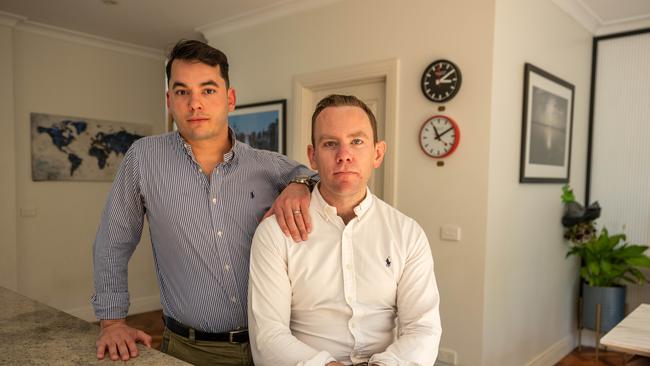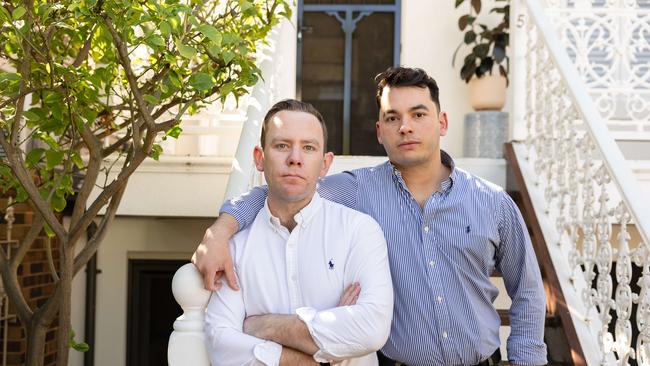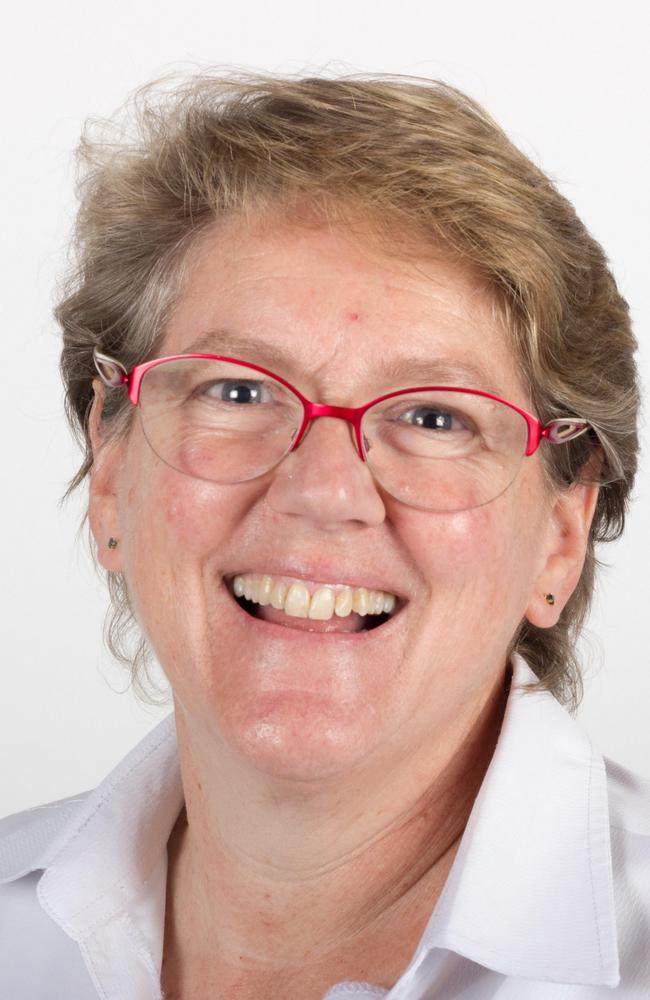Melbourne couple’s Colombian IVF surrogacy nightmare
An Australian couple paid $65,000 for an overseas clinic to make their parenting dreams come true — but instead, they say they have been subjected to an “emotional rollercoaster of failures”.

Fertility
Don't miss out on the headlines from Fertility. Followed categories will be added to My News.
A Melbourne couple paid tens of thousands of dollars for a Colombian clinic to make their parenting dreams come true — but instead, they say they have been subjected to an “emotional rollercoaster of failures”.
And experts say their plight is not uncommon.
Charles and Emmanuel signed a contract with Tammuz Family, an Israel-headquartered surrogacy agency with programs around the world, almost three years ago but remain childless.
Commercial surrogacy is illegal in Australia, and while the couple tried to find an altruistic surrogate, it just “never happened”, Charles said.
The couple says they paid more than AUD$64,900 to Tammuz Family, and if a surrogate does fall pregnant with their child, they would be expected to pay additional fees worth more than $45,000 during the pregnancy.
Tammuz Family’s website says the average length of a “surrogacy journey” is about “15 to 18 months”, with Colombia typically 18 to 20.
The couple, in their 30s, chose Colombia due to cost, and because it lets same-sex couples access commercial surrogacy.
They said they also paid for flights to visit Bogota in January 2023 to attend Celagem clinic to donate sperm.
Tammuz Family’s head of operations in Australia, Steven Swanepoel, said the time frame of 18-20 months was from when the sperm was received at the clinic, and not when the contract was signed.
But Charles said clinic wait times contributed to the delay between the contract in May 2022 and the trip.
Ultimately they ended up with five viable embryos — but they either did not survive or transfers to the surrogate failed, Charles said.
“Given the amount of embryos that we had, the likelihood of every single one of them failing was very, very low, and yet, here we are,” Emmanuel said.

Emmanuel said after running out of embryos, the couple had to start the process “all over again”, which involved finding another egg donor.
The couple, who did not want their surnames published, said a suitable donor was eventually identified, but by then they had “lost all confidence”.
“The emotional rollercoaster of failures that we’ve encountered to date, we don’t want to do that again,” Charles said.
“If you make noise and complain, no baby and no refund — that’s the really hard part.”
While a contract states the fees were non-refundable, the couple signed up to a “guarantee” plan, which includes “as many donor cycles and subsequent embryo transfers as needed until a live birth”.
Mr Swanepoel said fertility treatment was complex and outcomes could take time.
“Success depends on unpredictable biological factors like embryo quality and uterine response, and embryo transfer failure is a recognised part of the IVF process — even under ideal conditions,” he said.
“That’s why Tammuz and Celagem (offer) a guaranteed program: unlimited IVF attempts and transfers until a live birth is achieved, with no additional cost beyond the original program fee.
“We work with human biology — not a controlled system — which is exactly why our program exists: to offer certainty in an uncertain process.”
Mr Swanepoel said global demand for surrogacy had grown significantly, especially in affordable and legally accessible destinations like Colombia.
“Tammuz, in partnership with Celagem, manages waitlists carefully to ensure fair and responsible co-ordination for all intended parents,” he said.
“While medical and biological factors can occasionally extend timelines, we set realistic expectations during the consultation process, including discussing potential delays.”
He said Celagem had a “strong track record” of success.
“We remain fully committed to supporting Charles and Emmanuel,” he said.
The couple said they were speaking out as they did not want other families experiencing this.
Emmanuel described the experience as “traumatic”.
“You mourn the death of what could have been,” he said.
“It’s been extremely difficult.”
Charles said the couple would love just to exit this program and be able to go on a different journey with another provider.
But he said this was hard to do when “so much money” had been paid to Tammuz Family.
Surrogacy lawyer Sarah Jefford said “guarantee” plans were not unusual in the industry.
“If I speak to clients before they enter one of these contracts, I point out that there aren’t really any ‘guarantees’ when it comes to reproduction and fertility,” she said.
She said recent clients had expressed similar stories to Charles and Emmanuel.
“In one case I am aware that the intended parents paid $80,000 to a provider and three years later, they have nothing to show for it and the embryos are stuck in another country,” she said.
Ms Jefford noted that was a different provider to Tammuz Family.
“We need to make surrogacy more accessible in Australia, so that intended parents do not feel compelled to go overseas,” she said.

Human rights expert Professor Paula Gerber, from Monash University’s Law Faculty, said Australia was a wealthy country with superior health and legal systems, and should provide all modern reproductive services in a safe and regulated environment that protects human rights.
“It is shameful that if people need surrogacy to start their family, we force them to travel to poorer countries with inferior health care services and regulation,” she said.
She said Australia’s prohibition on compensated surrogacy was outdated and in urgent need of reform, and the Australian Law Reform Commission’s inquiry into surrogacy laws was timely and welcome.
Surrogacy expert Dr Ju Attawet, from Swinburne University of Technology, said resources including anecdotal evidence indicated many intended parents had faced significant delays, failed embryo transfers, unexpected costs, and poor communication with overseas providers.
“Unfortunately, once money is transferred offshore … there is little to no legal protection available,” she said.
“This leaves couples like Charles and Emmanuel effectively stuck.”
Dr Attawet said there was currently no international legal framework regulating cross-border surrogacy.
“While further regulation is urgently needed, global reform is unlikely in the near future due to ongoing disagreements between countries,” she said.
“Realistically, meaningful regulation must come from destination countries themselves.
“Although Australia cannot legislate internationally, it can strengthen protections for its citizens.”
More Coverage
Originally published as Melbourne couple’s Colombian IVF surrogacy nightmare





